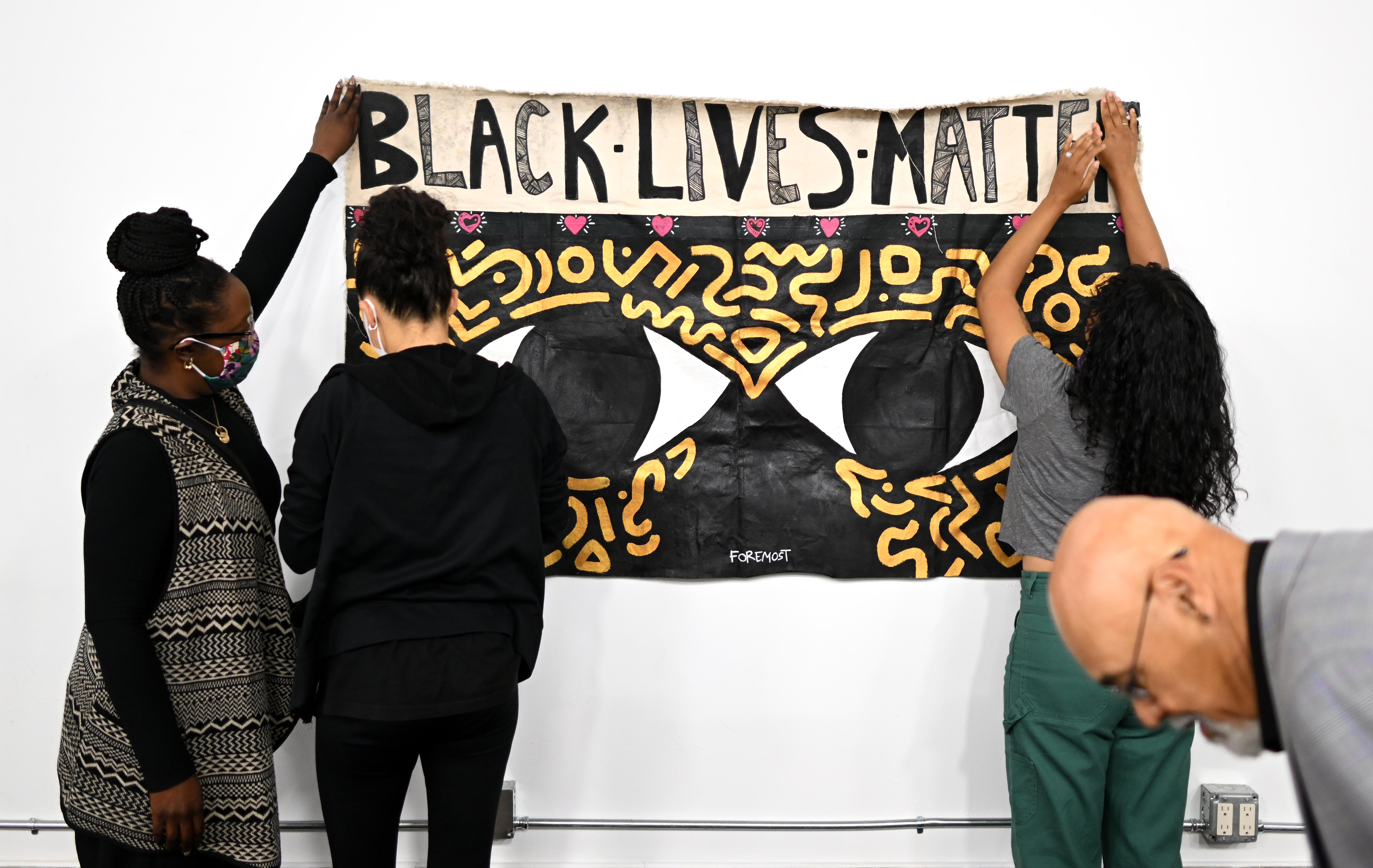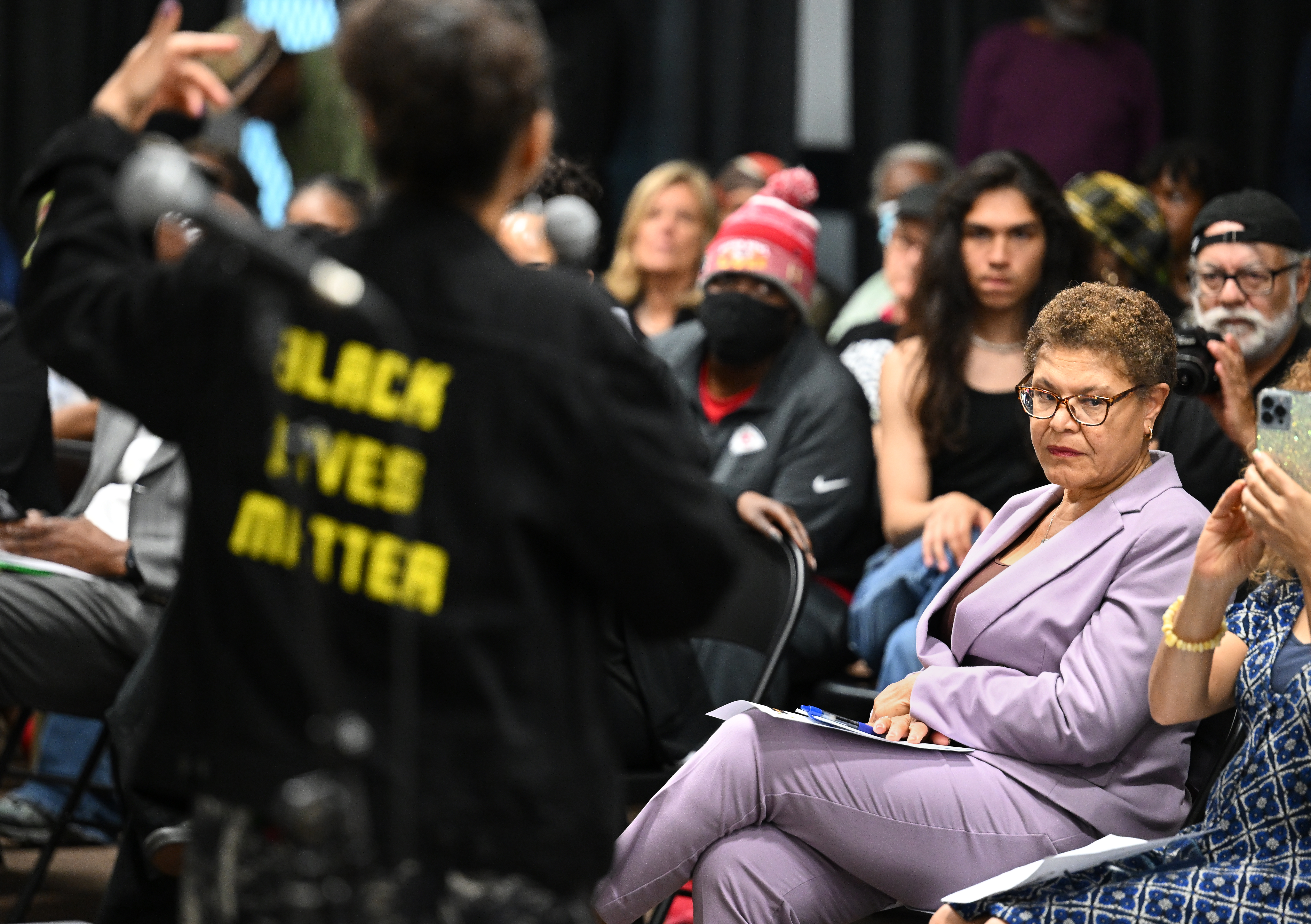If there are no police or guns, what does it take to make us feel safe? LA has a new answer
LA politics
Eric D SmithMay 1, 2023
Not long ago, the impartial Public Policy Institute of California released a few polls showing that most adults in this state believe violence is a problem in their neighborhood and fear that they or their loved ones will be victims of crime.
At the same time
less less
more than half of adults say that the police do an excellent or even good job in the fight against crime and violence. No doubt some blame declining police staffing levels, but others point to racial profiling.
Of course, none of this is particularly surprising. What the polls found is completely consistent with the stupidly binary public safety debate, both locally and nationally.
There are people who want more police on the streets and people who don’t. Those who believe that violent crime is on an unprecedented rise and those with armed historical data who argue that this is not the case. And I’m not even talking about guns, at least not yet.
With so many people so polarized, for a long time I thought we were no longer making progress. Then, one evening last week, I saw something in Leimert Park that made me think again.
::
“When we say ‘defunding the police’, we mean divesting of failed social policies. Divesting systems that cause harm so that we can invest in healthcare systems.”
Melina Abdullah, the co-founder of Black Lives Matter-LA, paced the cavernous main room of the recently opened Center for Black Power, mic in hand, her voice rising and falling with every step.
She had gathered in Leimert Park along with dozens of members of other activist groups to present their annual People’s Budget, a community-led counter
Proposal for the $13.1 billion official budget plan prepared by Mayor Karen Bass and pending before the Los Angeles City Council.
Based on a survey of residents, mostly from South LA, the People’s Budget is packed with forward-thinking priorities, though its overarching premise is to “reinvent public safety” by redirecting billions of dollars from the police to social services and facilities for long-neglected communities of color.
“We believe in transforming the world so we can build new systems that actually protect black people,” Abdullah explains.
Unlike Eric Garcetti, who as mayor generally tried to avoid activists (especially after they began protesting outside Getty House and regularly antagonizing members of the city council), Bass accepted Abdullah’s invitation to join them. to join the Center for Black Power.

Sure, she’s known many of these activists for decades, so long that when she arrived, the scene was something like a family reunion, with cuddling, laughing, and sharing old stories.
I’m glad to be here, said Bass. I have always come to the community because this is my community.
Still, it speaks volumes about overcoming the polarization that she actually showed up to sit in the front row and stare at a slideshow about defunding the police a slogan that aided Abdullah
making currency popular
and Bass once named one of the worst… ever.
Indeed, during the campaign, few things seemed to irk the then-Congresswoman more than having to repeatedly deny that she had plans to “punish” the Los Angeles Police Department. “How many times am I going to get asked that?” she snapped once when I brought it up.
Fast-forward a few months, and her budget proposal pushes to give the LAPD, which already has the bulk of our tax dollars, another $87 million to hire 400 officers to restore the department’s ranks to 9,500.
I know that’s ambitious, but I think it has to be done, she told The Times last month.
After Abdullah stood up for a few more speakers to defend why that doesn’t have to happen, Bass finally got a chance to let her speak.
First, she recognized that public safety requires a comprehensive response. “You have to address the root causes,” she said. “You have to address the health and social, economic issues that lead to our problems.”
But she didn’t back down from her plan to fund more police, noting that many residents were standing outside
by
South LA from neighborhoods that are objectively safer than many of the South LA neighborhoods have told her they want more cops.
“I need to run for mayor of the whole city,” Bass said, as she has done many times before. “And I know the sentiment in this room. But it doesn’t represent the sentiment across the city.”
Just as many in the room seemed disappointed, ready to stop listening and return to their formerly polarized state, the mayor said this: “We are going to invest in reimagining public safety through the Office of Community Safety.”
Came out the smartphones to record video as she introduced
carts
Lane, Deputy Mayor of the newly created office.
While it hasn’t gotten much attention with all the back and forth about funding for the LAPD, Bass has described the office as key to the city’s efforts to break the cycle of violence and crime. In fact, it embodies much of what is on the people’s budget, prioritizing investment over punishment.
Lane explained more about her aspirations when I caught up with her a few days later.
In the short term, the office is working with nonprofits to oversee the city’s gang intervention and anti-violence programs, as well as manage the expansion of unarmed teams responding to emergency calls. But in the long run, she expects there will also be economic opportunities and other resources.
“The vision is that the office should be the infrastructure for a comprehensive approach to security,” Lane told me. “We’re kind of pulling from what’s out there in the city, but our goal is to actually build out a system.”
That means moving beyond scattered criminal justice reform programs and “institutionalizing” the mindset of City Hall. In other words, she wants the Office of Community Safety to be as important and as well funded as the law enforcement-focused Office of Public Safety.
“There’s a national discourse about safety,” Lane said. “And LA is able to really model what it might look like to have significant investments in community-led safety solutions and have a comprehensive approach to safety.”
::

Ultimately, both the local and national public safety debate boils down to this: What does it take to make the public feel safe? (Emphasis on the word “feel” because the crime data does
It
not always follow.)
Too often, when Americans feel unsafe and scared, we reflexively demand more police and increasingly buy guns for self-defense. We do this because this is what we’ve always done.
That’s why I don’t doubt Bass or Lane when they tell me that despite the investigation that led to the People’s Budget, some black and Latino residents in South LA also want more cops in their neighborhood.
One activist acknowledged this at the Center for Black Power, saying, “One of the things that happened to history is that we conflated policing with security, when policing has historically been used as a tool of force and control.”
I agree with that. But activists have clearly had less
or at least uneven
Good luck getting the general public to agree.
More police are called for. So what is needed is a public safety alternative. Not a collection of reform-oriented programs or piles of data on actual crime rates, but a strategy to help people feel safe. One that could be replicated in other cities and perhaps used to push back Republican politicians who spread fear mongering about crime.
Part of the reason so many Americans feel unsafe and scared is because so many more Americans now own guns.
Studies show that violent crime is nowhere near 1990s levels and that more guns just means more deaths. But as I wrote recently, that hasn’t stopped people from feeling they need to buy and carry a gun for self-defense.
It is unlikely that gun violence and fear will decrease significantly until there are fewer guns in circulation in America. And we will never see a significant drop in the number of guns in circulation until Americans feel safe without them.
The Office of Community Safety could provide a proof of concept on how to do just that. How to get past the polarization to achieve true public safety.
Lane doesn’t necessarily see her office as an alternative to investing so heavily in law enforcement. But I do that especially when it gets more money than the LAPD. I would call that progress.
Fernando Dowling is an author and political journalist who writes for 24 News Globe. He has a deep understanding of the political landscape and a passion for analyzing the latest political trends and news.



